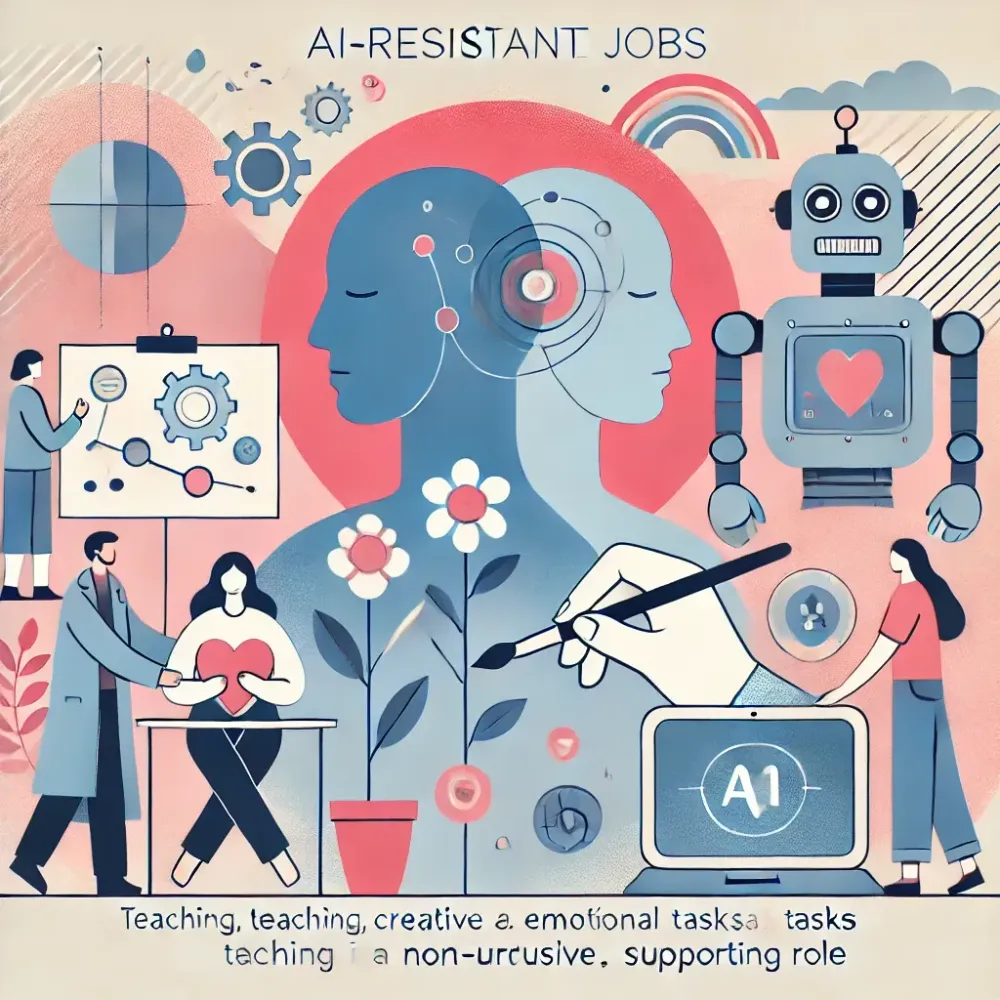Jobs That Remain Resilient in the Age of AI
- common.posted-on 28/11/2024

As artificial intelligence (AI) continues to advance, it is transforming industries and automating tasks across many professions. However, there are jobs that AI is unlikely to replace, at least in the foreseeable future. These roles typically involve uniquely human skills, such as creativity, emotional intelligence, and complex decision-making, which remain challenging for machines to replicate.
In this article, we’ll explore the types of jobs that are resistant to automation, why they remain safe, and how individuals can future-proof their careers in an AI-driven world.
Characteristics of AI-Resistant Jobs
Jobs that are less impacted by AI often share these characteristics:
- High Emotional Intelligence: Professions that require empathy, interpersonal skills, and the ability to navigate complex human emotions are difficult for AI to emulate.
- Creative Problem-Solving: Creative roles, where innovation and out-of-the-box thinking are essential, tend to resist automation.
- Physical Dexterity in Unstructured Environments: Tasks requiring fine motor skills in unpredictable settings remain challenging for AI and robotics.
- Ethical Decision-Making: Situations requiring moral judgment, nuanced understanding, and social responsibility often depend on human intervention.
- Complex Relationship Management: Building trust and relationships, especially in roles involving negotiation and persuasion, is still the domain of humans.
Jobs That AI Cannot Easily Replace
1. Healthcare Professionals
- Doctors and Nurses: Diagnosing complex conditions, performing surgeries, and providing emotional support to patients require both technical expertise and human empathy.
- Therapists and Psychiatrists: AI can assist with mental health tools, but deep emotional understanding and building trust are uniquely human abilities.
2. Creative Artists
- Writers and Novelists: While AI can generate content, creating impactful literature with emotional depth and originality remains a human forte.
- Musicians and Composers: Crafting music that resonates on a deeply emotional level involves personal experiences and creative inspiration.
- Visual Artists and Designers: Although AI tools assist with design, the originality and cultural nuance of art often require a human touch.
3. Educators and Trainers
Teaching isn’t just about conveying information. Great teachers inspire, adapt to individual learning needs, and provide mentorship. These human elements are beyond AI’s reach.
4. Trades and Skilled Labor
- Electricians, Plumbers, and Carpenters: These professions require working in unpredictable environments and adapting to unique challenges. AI lacks the physical adaptability and problem-solving capabilities for such tasks.
5. Social Workers and Counselors
Helping individuals navigate personal crises and providing social support requires empathy, cultural understanding, and relationship-building that machines can’t replicate.
6. Entrepreneurs and Innovators
While AI can support businesses, the vision, risk-taking, and leadership necessary to create and grow businesses remain uniquely human.
7. Legal Professionals
- Judges and Mediators: Interpreting laws, applying ethical reasoning, and resolving disputes involve nuanced understanding and judgment.
- Trial Lawyers: Building compelling narratives and persuading juries are skills AI cannot master.
8. Ethicists and Philosophers
As AI grows, the need for human oversight in ethical debates and moral dilemmas will increase, requiring human thought leadership.
Why These Jobs Are AI-Resistant
These jobs are resilient because of the following reasons:
- The Limitations of AI: AI struggles with ambiguity, subjective decision-making, and understanding human emotions.
- The Value of Human Connection: Many professions rely on trust, empathy, and relationship-building.
- The Importance of Physical Adaptability: Jobs requiring work in varied, unstructured environments remain outside AI’s practical capabilities.
How to Future-Proof Your Career
- Focus on Soft Skills: Enhance skills like communication, emotional intelligence, and problem-solving.
- Embrace Lifelong Learning: Stay updated with trends in your industry and acquire new skills.
- Develop Technical Literacy: Understand AI and technology to work alongside these tools.
- Cultivate Creativity: Foster innovative thinking through brainstorming and collaboration.
- Build Relationships: Networking and relationship-building open opportunities relying on trust.
The Future of Work in an AI-Driven World
While AI will continue to automate routine tasks and reshape industries, it’s unlikely to replace roles that require uniquely human skills. By focusing on these roles and adapting to technological changes, individuals can thrive in the evolving job market.
Professions that combine human creativity, empathy, and decision-making with technological fluency will define the future workforce.
